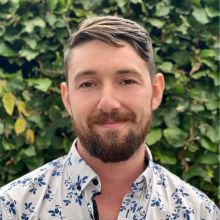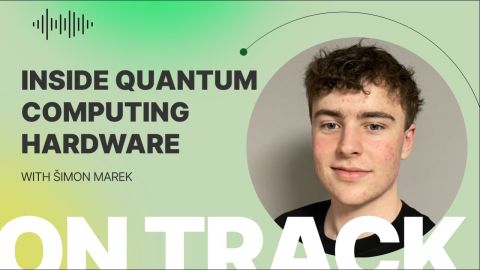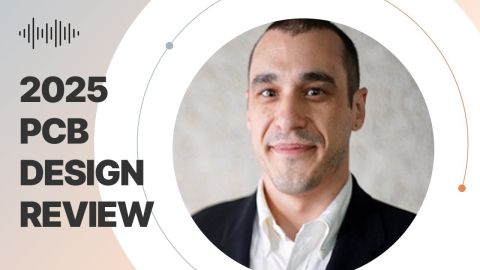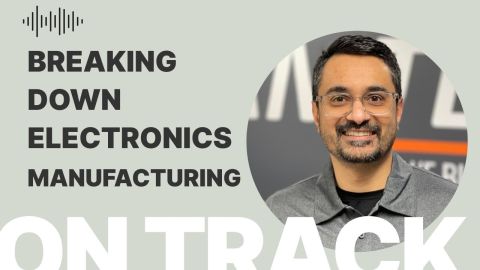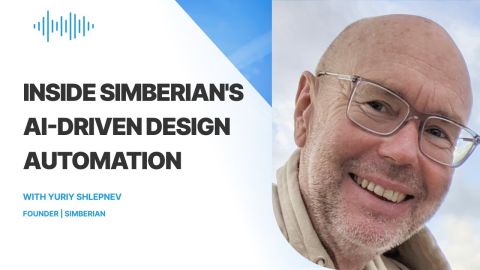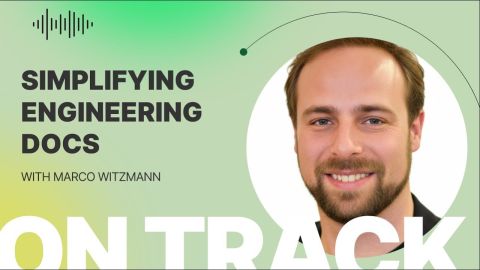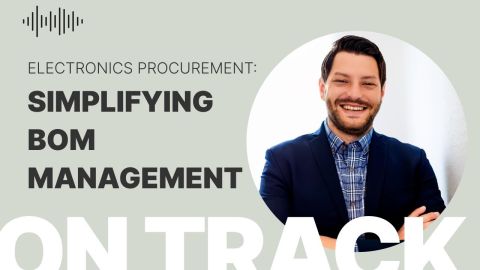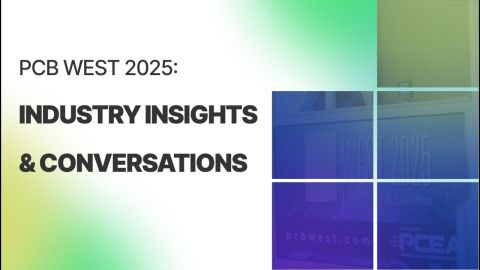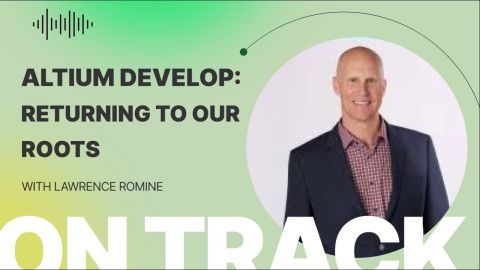Making Electronics Culture Cool Again: The Circuit Pulse Show

Welcome to the OnTrack Podcast! In this episode, we dive deep into the vibrant electronics culture with special guests Inga Woods-Waight and Joel Higgins from the Circuit Pulse Show. Discover how they are making ELECTRONICS CULTURE and tech fun and accessible, engaging younger audiences, and revolutionizing educational content in the electronics industry. If you're passionate about electronics design and want to stay updated on industry trends, this episode is a must-watch!
Listen to the Episode:
Watch the Episode:
Episode Highlights:
• PCB design insights and tips
• Engaging content for the electronics community
• The rise of educational electronics videos
• Inga and Joel's journey and success stories
More Resources:
- Follow Inga Woods-Waight on LinkedIn
- Octopart's YouTube Channel
- Check Out Full Episodes of the Circuit Pulse Show
- Interested in the topic of electronics culture? Check out this past episode of OnTrack on the topic of microelectronics.
Transcript:
Zach Peterson: Yeah, these are all really great points. And I think corporate marketers out there, just in the wild in the electronics industry, should pay attention to maybe this new approach. Because, at some point, a lot of this, I mentioned kind of the corporate communication generally in the electronics industry, it all starts to look like each other across different companies. And everyone has trouble standing out, and this is finally something different and, like you said, fun to watch.
Inga Woods-Waight: It's a breath of fresh air.
Zach Peterson: Yeah.
Joel Higgins: Yeah.
Zach Peterson: It feels like you're working with your buddy in the lab, like in a startup garage.
Joel Higgins: Yeah, right.
Inga Woods-Waight: I know.
Zach Peterson: Something you can relate to. You could be like, "Oh, do you know about this?" He'd say, "Oh, I didn't know that was going on in the news, let's buy stocks or something."
Jole Higgins: Yeah, it's like conversations you would have anyway. We're just recording it.
Inga Woods-Waight: Yeah.
Zach Peterson: Hello, everyone, and welcome to the "Altium OnTrack" podcast. I'm your host, Zach Peterson. Today, we have a very special treat. We are talking with Inga Woods-Waight and Joel Higgins from the "Circuit Pulse Show." If you have subscribed to the Octopart channel, you have probably seen this new show come on to YouTube, and I am very excited to talk to them both today about this new show. Guys, thanks for joining me today.
Joel Higgins: Thank you for having us.
Zach Peterson: Absolutely. So before we get started, prior guests of the "OnTrack" podcast who are watching this right now, probably recognize Joel's voice because he's the invisible guy in the background, giving the guests all of the format information and what to expect when they show up here for the "Altium" podcast. So now you're the guy on camera. Yeah, and I have to see my face all the time, and I'm never behind camera, so I don't even know, what is a camera? No, I'm joking. Of course.
Zach Peterson: Your whole life is a camera.
Jole Higgins: Exactly. And then viewers of the TikTok channel, who we hope have migrated over to YouTube will probably recognize Inga's smiling face from the Altium TikTok channel.
Inga Woods-Waight: Yeah. Hi, I'm Inga.
Zach Peterson: So Inga, you've been on TikTok for quite a long time, and then eventually you kind of migrated over from your own TikTok over to Altium. Is that correct?
Inga Woods-Waight: Yes, that is correct.
Zach Peterson: So what kind of stuff do you do on TikTok? You gotta fill us in.
Inga Woods-Waight: I mainly do a whole bunch of educational content, where I'm teaching people either how to do tutorials and how to work with different softwares or hardware. And I do like talking about life struggles, you know, being a non-traditional student, going back into college and everything that I've been learning and just trying to connect with people and build up a community to educate and bring in people to help out each other or have a supportive environment. And that's kind of how I got into putting on TikTok videos is showcasing this stuff and having people relate to it and want to be part of it. And that's how I got into making educational content.
Joel Higgins: That's really cool. And my hope has always been that as more people in our age range start to realize the power of these kind of short form video platforms, hopefully, we can make electronics really cool again.
Inga Woods-Waight: Oh, absolutely.
Zach Peterson: So if we could, Inga, maybe tell us a little bit about yourself and how you kind of made the journey into to working in electronics and how you guys got hooked up on doing the "Circuit Pulse Show."
Inga Woods-Waight: Yeah, sure. So as you know, being as a nontraditional student going back into college, I had my fair share of struggles of learning and not being able to find tutorials or how to do things. Like when I was first doing my first breadboard, I'm more of a visual learner, so you could read all about it in papers and everything like that. And not being able to see like the actual diagram, okay, well you need to connect this line to line one and then put this program into it and how to do it, there was nothing really available for me to be able to watch and be able to learn from that and follow from their steps. So I felt like, okay, well if nobody's doing this then I should do this, because I know it's not only gonna help me but other people as well. And so I continued doing that, and I eventually found myself doing a whole bunch of videos. And then I reached out to Altium, and then that's how I made the whole connection with, okay, well let's make educational videos, fun and interesting for everybody and especially college students, 'cause that's one of my demographics. And then people going into the workforce or wanting to do certification trainings and all that stuff make you more flexible and more adaptable and more how do you say, uh, uh, appealing, appealing.
Joel Higgins: Yeah.
Inga Woods-Waight: So anyways, I've been with Altium for a while, and then me and Joel, as Joel is behind the scenes a lot, we started talking. He says, "You know how interesting it would be to get something going, talking about all these fun projects and all that stuff?" And then he would be talking about the news. And so we just kind of tried our own little pilot series and try to test it out. And we had a blast. And I says, "You know, this is something people would definitely would love to see," 'cause you kind of miss having that comfort content of being able to like, when you're just watching YouTube, you just want to have something play in the background, but it's also educational that you learn from. That's kind of like what the feel we were going for, because you can't find that nowadays. And so having something in the niche of electronics in the industry in this field and engineering is I think is something that's absolutely necessary. What do you think, Joel?
Joel Higgins: Yeah, I agree. I mean, when I edit these episodes and as I'm editing them, I'm really conscious of trying to make a place that's more of a lifestyle sort of thing. It's like, I want people to come and hang out for a long time, because Altium has such a cool, robust array of offerings for people who are interested in electronics design on "Altium Academy," on "Altium Stories." Like we've got a bunch of different sort of ways to reach people. But one area that I really didn't see us serving was students, makers, hobbyists, people who just want to chill and get exposed to some news, what's going on in the industry, see what's going on out in different projects with creators on various platforms, and then get kind of deep dives on components. You know, it's Octopart, so we have to talk about components. So yeah, I saw it as like an area that we weren't really talking to, and we started talking to it. And I don't know, it's really, really fun. I mean, I'm kind of a news-news guy, so I tend to handle the supply chain information sort of stuff. And that's a really interesting thing because we go on these long, probably too long deep dives.
Zach Peterson: No, they're so informative. Like the things I learned from Joel, I'd be like, "I didn't hear about this. What is this?" And then he explains all the details about it. I'm like, "I had no idea."
Inga Woods-Waight: So he even keeps me informed so like I feel like everybody benefits from it.
Zach Peterson: Yeah, and likewise. I mean, Inga handles our component corner section on the podcast or on the show, which is just, you know, she'll bring out a component and just do a deep dive, like all the applications that she's used, applications she's come across, ways that she's incorporated in her designs in the past. And I learned so much from that. So I feel like the show is mostly me and Inga exposing each other to new stuff, and then the guest comes on and blows both of our minds.
Inga Woods-Waight: Yeah.
Zach Peterson: That's awesome. That's awesome. So backing up for a second, Inga, you doing TikTok, I'd imagine that this skews a bit younger in terms of the demographic, because I don't really expect C-level executives that run an EMS company to be on TikTok scrolling through here. But I definitely imagine younger students, maybe early professionals, people that are closer to our age range really dig this kind of thing and eat it up.
Inga Woods-Waight: Oh yeah, I would agree. But I feel like maybe with my demographic, it is very mixed. I do have a lot of younger audiences, 'cause I'm doing something that's appealing for them. But you would be surprised, I do have those C executives on my TikTok. I even have some NASA engineers. I have some retired people, some people who work up Boeing and a whole bunch of other places. You would be surprised if people you would meet and connect with and network with there. And the fact that they'd be like, "Inga, you're doing such a great job. Continue doing this. This is something like my daughter would want to see. So you'd be surprised of who you'd be exposed to, 'cause you never who is watching. So I feel like it's beneficial to all. And then like having that stamp from the old engineer saying like, "Yep, you're right. This is definitely a new different way of showcasing this and it's what's needed." So I feel like, TikTok is so diverse. It's not only TikTok but like social media now that they're gravitating more towards that.
Zach Peterson: Well, and then I feel like you've probably taken some of that philosophy with you over to "Circuit Pulse" because the "Circuit Pulse Show" is not like stuffy, corporate communications. You know, if you look at a lot of video-based communications from folks in the electronics industry, it is consistent with the demographics, I would say, in our industry. It feels as old as the people who created it. I don't wanna insult anybody out there, but this is much more fresh, much newer, much more fun to listen to and watch. And kind of like you said, it's kind of fun to have in the background. But what do you think about that?
Inga Woods-Waight: Oh, I absolutely agree. I feel like we, as a younger generation, well, I'm not technically that young, but still, I feel like we're so tired of seeing things that are so formal, like you sit in class and you're watching lectures. We want something that's fun, interactive, something that's gonna capture attention, something that you feel like you can be able to do and not have to have like 10 years of experience to be able to partake in this or be able to just sit down and learn about it and not feel like, "Oh, I feel so stupid. I don't know what they're talking about." When we break down and make it easy to understand for everybody, 'cause we really want to bring that wholesomeness to it as well and also interest and intriguing them, bringing their curiosity to learn for that. Because I feel like sometimes, even as like older engineers, they get tired of it. They kind of lose their passion for it. And then when I bring up something like, "Oh, Arduino, you remember this," or "You remember back in the day when you had perfboards, and you had to wire everything like that." They'd be like, "Oh yeah." So I feel like that's definitely something we are trying to bring to the Octopart and like for the "Circuit Pulse." So I feel like bringing that vibe, bringing that energy, bringing that excitement and curiosity for it is definitely what's gonna be something that's gonna work for us. Don't you think, Joel?
Joel Higgins: Yeah, I would totally agree. And something that I'm really proud of is it turns out when you start talking to these people, they pay attention. It's a really underserved community. and I'm kind of an analytics junkie. And so I go in and I watch and I look and see who's watching this stuff. And on YouTube, our Octopart analytics for female viewers is way higher than basically anywhere else on Altium, as far as I'm aware. We're approaching, at times, like 50/50 split. And our age range split is really wide for "Circuit Pulse." It's like teenagers to 60 year olds. So the second we started speaking to these people, they started listening and getting involved and commenting. And it's just really, really heartening, because I remember Inga and I, we all, everyone present in this virtual room went and did PCP East and PCP West together. And I remember Inga and I having conversations, off-camera conversations at these conferences about how we could sort of approach people that we were seeing at these conferences, but we weren't really making content pointed at them yet. And I feel like "Circuit Pulse" and what Inga is doing on TikTok is like the manifestation of those conversations. We finally figured out a way to start talking to those people. And they're out there and they're hungry for this kind of stuff. So I'm really heartened and really proud of that.
Zach Peterson: You know, I feel like the folks who are probably listening to this and and wondering what's going on in "Circuit Pulse" are much more used to the kind of almost like webinar format, like all the learning opportunities are just webinar format or they're kind of, like I said earlier, a little more of a stuffy kind of podcast. I mean, I feel like on "OnTrack," we get a little stuffy sometimes, but I try to liven it up a little bit when we're doing episodes, but we don't wanna make it just feel like it's a one-way kind of thing where it's just a webinar. So maybe tell us, if you could, both of you, what can people expect if they tune into "Circuit Pulse"? I think you guys mentioned a couple of segments and sometimes there are guests. So maybe give us the overview here.
Inga Woods-Waight: Yeah, every episode is three segments. We like to keep it basic. The first segment is some kind of current events and news segment that relates somehow to what Octopart does. So that would be supply chain, component stuff, tech stuff in general. And I usually host that. So we kind of have this fun habit on the show where Inga doesn't really know what I'm gonna do before we record. And I don't really know what Inga is gonna do. We maybe have a couple words, you know, like a couple bullet points in a document or something, but we don't know. And that's on purpose because we want to-
Inga Woods-Waight: Surprise factor.
Joel Higgins: Yeah, surprise. We want real, authentic reactions to what we're talking about. So I take that first section, we do that. Second section is a guest. And each of these sections are meant to be around 15 minutes, but it depends. Second section is a guest. It's usually someone from social media who's done something really cool or a collection of really cool stuff that we just want to bring on, ask them how they did it, talk about it. And like the last episode, we had a woman named Louise Katzovitz who does this really cool tech meets fashion stuff, digital wearables. And it was a great conversation about how Louise designs her stuff and who their inspirations are. And we got a little bit into the weeds and particulars on what she does and then a little bit more grand or a little bit more macro just about fashion and tech in general. And the third section is Component Corner and that is hosted by Inga. And Inga, you wanna talk a little bit about what that section is?
Inga Woods Waight: Sure. So like, basically the component corner is where I would talk about things like Arduino or like certain little things that I've used in projects or like this heartbeat sensor. So I kind of like bring up, okay, well these are things that you could be able to use in projects or things that you can be able to use for like everyday activities or making like a laser buzzer for like backing up your car in a garage so you don't hit the wall if you don't have good judgment. So all these little fun things that people could be able to make projects with or spark an idea and create something new. 'Cause I feel like sometimes we're so used to, as engineers, you want to over-complicate some things, 'cause you, you wanna see, okay, how far can I test this? How far can I carry this? Or what all can I add to this that's gonna make it even better. So I feel like having that fun curiosity bring into it and then try your own projects is like what the component part corner is about. So I feel like exposing them to, okay, what, what is this component can do, what's its limits, where you can find it on Octopart and like get the data sheets or the schematics and all that kind of stuff. So that's what the component corner is about.
Zach Peterson: So this all sounds like a lot of fun and a totally different way to present educational material and talk about industry issues. So if we could, let's take a quick look at a clip.
Inga Woods-Waight: One can easily imagine a world in which we get down to the bare bones in these tech jobs, and then they realize, "Oh, we need to develop these sorts of jobs within our AI spaces that require intuition, emotion, empathy, that sort of thing, because they realize there's a need for it. They also point to, in this article, sixfold increase in data related jobs between 2018 and 2022. So data, and we've already talked about that a little bit in this little deep dive, data is also gonna be a huge part of this.
Zach Peterson: Oh yeah, data always a gold mine.
Inga Woods Waight: Yeah. And it's only more, because what do these AI models need? Data and lots of it. And they need a hierarchical systems and organization for their large language models and all that stuff. A lot of countries are getting right now an influx of money from programs like the CHIPS Act. And so finally this article also closes out by saying that it is exceedingly likely that what is actually occurring in large part is relocation of these jobs, not so much just complete disintegration. So I think that covers, basically, what is going on. I think that's the story.
Zach Peterson: Okay. So this is very cool. I see that you guys are much more conversational than probably what you would ever see on like a panel discussion or a webinar or anything like that. So I think this is a lot of fun. So far, Joel, you mentioned, you know, digging into kind of the analytics of who's watching. It's really a broad range of people. And then you mentioned, it's almost 50/50 men and women. Why do you think that is? What has the industry been doing wrong for so long that they haven't managed to capture more of the female audience?
Joel Higgins: I mean, I would give a very short answer, because I think Inga is much better positioned to answer that. But my very obvious observation is that we have a female cohost, and it's a young woman who's in the industry who knows what it's like to be a woman in the industry that viewers can relate to. And then also I noticed, at the conferences that we've done together, watching Inga talk to people and watching female or female-identifying presenters on trade floors and stuff, have conversations. I wouldn't go so far as to say that like it seems like there's a little bit of a guy's club culture, but I would say that it definitely seems like, for whatever reason, I'm sure Inga will speak with a lot greater insight into this. It does seem like there seems to be some kind of tension in terms of like having conversations with women in tech. I don't quite know what that is, but, I don't know, does that resonate Inga? Do you feel that kind of thing?
Inga Woods Waight: Oh yeah, I think you definitely hit the nail on the head. I feel like when it comes to talking, for me, I can be able to go up and talk to other women. It's not intimidating, 'cause I know like, "Okay, well you're in the same field as me. We both know how hard we work to get here and like all the obstacles we have to face or like little snarky comments here and there. We just have to learn to like overcome it." But I feel like we're able to talk to each other, not feel judged or questioned about it, 'cause like we know our stuff and being able to not have to like second guess ourselves or feel intimidated by that presence is like another thing. But I feel like also being able to like reach the female demographic is there's not a lot of women out there, and we don't have much role models to look up to. And I was exposed to Tara Dunn, and I love her. And I wish I could be able to see her more and doing these like talks and everything like that for the younger women in the audience that they could be able to relate to, because seeing those women out there doing these things, it makes a difference. You know, it's just like one little domino that's gonna hit everything else, and it's gonna waterfall down. So I really feel like there's not really much presentation or much people out there talking about it, because, I don't know, it's difficult to say, because you want to seem professional, you want to seem presentable, you want to seem relatable, but it's kind of hard to do that when you need to keep a professional setting and not say there are struggles in the industry, but I don't wanna be a forefront runner and be like, "Oh, this is the problems you need to fix it." You just kinda have to like put it in a back burner and just do the work, because that's what I feel like a lot of people are just focusing on just work, work, work instead of building the networking and like, you know, the, the, how do you say, the community for that.
Joel Higgins: Yeah, yeah. And I mean, clearly the women are out there, they just need to be spoken to. I mean, that's something that I'm really learning as we go through "Circuit Pulse." And I don't know necessarily who's done what wrong in the past, but from our perspective with this show, it seems like all they really want is just for you to talk to them and reflects them and say here's a woman in tech to relate to, and here's what she's going through, and here's what she brings to the table. And then they just, it seems like so far anyway, that's it. They just want to be seen.
Inga Woods Waight: Yeah, and I feel like meeting Lauren Waslick, meeting her, I was like another person that I really admired because her team is like about 70 or 60% of women who does PCB design. I was like, "What? Where is this? And where can I get an internship there?" She would say the more you know that you know, the more you can build connections and be able to like relate to it. So I feel like it's definitely something that's needed and need to be more outreach and more showed on the platforms.
Zach Peterson: Yeah. You brought up our time at PCB West in 2023. While I was there, I actually talked to Priyanka Dobriyal. Tara Dunn introduced me to her, and she was over at the SMTA booth. And we were talking about some of this a a little bit, because she works in some capacity to promote women in electronics. And I think the demographic shift is kind of driving this mindset shift, especially among, you know, younger folks who run companies and who run HR and that kind of thing that we're just so starved for warm bodies in any capacity in the electronics industry that there really is kind of this acceptance that like we do have to speak to the other, all parts of the demographic spectrum in order to get people to care about electronics. If you look at the graduation numbers for new EEs, I mean it's been on this steady decline over the past, I don't know, 20 years or so. Part of that is software related, but I think also a lot of people just kind of gravitate more towards liberal arts, humanities, that kind of thing, and it's really been at the detriment to new engineering talent. So I think there's this big acceptance out there that no matter what, people who are in this industry, they have to try and get that next generation involved and they don't care who it is. Can you breathe air? Okay, great, come work in electronics. That's kind of the mindset.
Inga Woods Waight: As long as you have the interest and capabilities to do it. I feel like it's absolutely necessary.
Zach Peterson: Yeah, absolutely, absolutely. So what do you guys-
Inga Woods Waight: Because I remember, I remember you had done this talk, I forgot with who that was saying PCB designers and also the EEs are also on the main decline. Like a lot of them are retiring, so you need to reach that younger demographic. And it doesn't matter if they're male or female or whatever, as long as they're able to, are interested or have that ability to be able to get into it, you know, I feel like it's definitely something that we can be able to open the doors and have more accessibility and more visuals on it. So I feel like that's definitely something that everyone could benefit off of.
Jole Higgins: And I think accessibility is a great word here, because this is true for "Altium Academy" as well. I mean, one of the things I really love about working on your content with you, Zach, is on that content and also now on Circuit Pulse's content too, the global reach is really, really vast. I mean, we have times on Octopart where we have more people watch our Spanish subtitles than our English ones, which tells me, and our demographic playback is huge Latin American. And as we all in this room know, we have a lot of money going into component manufacturing in Latin America right now. And I think that's part of this conversation too, is it's like the education, the resources are gonna follow where that money's going. And so we're gonna see people come out of those communities who are gonna become engineers or gonna become designers. And if we can speak to those communities too, the international community and represent them and show them versions of themselves and talk about what they might be struggling with and what their challenges are and what their opportunities are, I think helping accessibility globally is only gonna help things too.
Zach Peterson: Absolutely.
Zach Peterson: Yeah, these are all really great points. And I think corporate marketers out there just in the wild in the electronics industry should pay attention to maybe this new approach, because, at some point, a lot of this, I mentioned kinda the corporate communication generally in the electronics industry, it all starts to look like each other across different companies and everyone has trouble standing out. And this is finally something different and, like you said, fun to watch.
Joel Higgins: It's a breath of fresh air.
Joel Higgins: Yeah, yeah.
Zach Peterson: Feels like you're working with your buddy in the lab, like in a startup garage.
Joel Higgins: Yeah, right.
Inga Woods Waight: I know.
Inga Woods Waight: Something you can relate to. You could be like, "Oh, do you know about this?" He'd say, "Oh, I didn't know that was going on in the news, let's buy stocks or something."
Joel Higgins: Yeah, it's like conversations you would have anyway. We're just recording it.
Joel Higgins: Yeah.
Inga Woods Waight: Exactly, exactly. Yeah, sometimes, Joel, I wish we had a candid camera going in the background to catch some of the stuff we go over.
Joel Higgins: I know.
Inga Woods Waight: We just need to leave it recording 24/7, right?
Joel Higgins: We do, stay tuned for the Altium Big Brother channel.
Zach Peterson: Yeah, right.
Inga Woods Waight: We're gonna do "Office" style. Did you steal my soldering iron?
Zach Peterson: Yeah, right.
Zach Peterson: Instead of like a stapler.
Zach Peterson: So I gotta ask you guys, so what's the vision for this kind of to grow this into something that's broader and really becomes kind of a fixture, I think, in terms of electronics content. The format is new and different. It's almost like something that you might take from like, I don't know, like a finance podcast or a fashion podcast or something like that. And it's that same kind of idea telegraphed onto electronics. And I think it works great. I don't want to have monotone podcasts on in the background. I want something that's more fun and conversational
Zach Peterson:And lively.
Zach Peterson: And so I think there's, yeah, lively exactly. I think there's some room for this to grow, but I want to know, what do you guys see for the long-term vision for this show?
Joel Higgins: I think that something I'm really excited about with this show so far is that we have this really nice blend of things that are very modern and happening right now and super important. I mean, we talked about the Google layoffs for an hour in the last episode. That's a very it's happening right now kind of thing. And then stuff that is more longer term, like Inga's conversations about the components that she's talking about are always gonna be relevant. So something that I would really hope that the show evolves into is a place where you kind of go for a little bit of everything culturally. And I use that word very pointedly. I think the best that this show could become is sort of a community hub for a culture that builds up around it and then kind of just goes on to become like the Octopart culture in general. I think that if we can achieve something like that, then Octopart becomes not just what it was built to be, which is this incredible tool for component sourcing and procurement and all this other stuff, but it also becomes kind of a cultural hub in and of itself where it's like people use the tool, sure, but they use the tool because it's so ubiquitous with the culture around it. At the end of the day, I mean, I feel like, and there's a bunch of books and stuff I've read that support this, that that is why people use the products that they use at the end of the day is that they align with the culture that the product or the brand purports to represent. And so if Octopart's culture becomes this sort of like, we care about what's going on in the world, we care about the components that we're showing on Octopart, we care about people who are using those components, and we want to talk about all that stuff, and that's just the culture that we develop and it's an international culture. It's across all spectrums of geography and gender identity and education level. And if you're a hobbyist and you're just getting started or you've been in this, you're a legacy guy, you've been in this for 40 years, you find something of value, I think that would be the highest good that I can imagine with the show. What do you think, Inga?
Inga Woods-Waight: Oh, absolutely. You just nailed everything I wanted to say and you put it so eloquently. But yeah, honestly, I really see a great future with this show because, like Joel said, it reaches and transcends all demographics, all areas, all generalities, because I feel like this is something that has been missing. It's something that you could feel that you can connect with. And I feel like, after the whole COVID situation, everyone became so isolated, like they came like individuals, like the whole loneliness and everything like that. And having this feeling like you're part of a community that like, okay, well I can reach out to this one in this community that can be able to advise me on components that could be able to use. Or like, okay, what's going on in the news? Same thing like what Joe was saying. Or exposing people who work with the same components or in the industry and bringing awareness about that and showing the things that you can do or what can become. So I feel like it's definitely a very wholesome community culture that we're probably gonna be building up or making it into, or maybe make it something bigger than that. So I definitely agree with everything that Joel said.
Joel Higgins: Well, you know, I'm hoping that this kind of show really brings this idea that tech is more than just software and that engineering in tech is so fundamental to what we do, but it's fun. There's kind of this tech bro culture that I think permeates software that probably turns people off, and they don't have anywhere else to go, even though they wanna be problem solvers and they're tinkerers and they like analyzing things and I'm hoping that they see electronics or even some other engineering discipline as a place that they can go and really find their passion.
Inga Woods-Waight: Yeah, yeah, I agree. I think that would be incredible. And there's so many different fascinating vantage points from which to view this industry. I think we also are attempting to speak to multiple vantage points. Supply chain analysts might be interested in this show just as much as up and coming designers or EEs. I think that Inga and I are just so organically fascinated by various parts of this industry that our fascination, I hope, kind of bleeds through the screen and people, and it becomes kind of this contagious thing where everybody's interested and everybody's curious, and we're all discovering answers together. I think you do stuff like that, and you really, hopefully, you inspire people to want to explore more on their own, which would be incredible.
Joel Higgins: Yeah, and even start up a conversation and have that conversation going, 'cause then you get more exposure, you get more understanding. You could be able to have that good communication and figure, okay, what is the root problem here? And then when you see everyone saying the same thing, you're like, "Okay, that's what it is." You know? 'Cause sometimes when you're in the industry for so long, you kind of become tunnel vision and then you need someone who's outside perspective that can be able to help you see, "This is what's wrong. We're telling you right to your face, but you don't see it." So it was like, it helps, having those conversations and getting that going.
Zach Peterson: Well, I'm excited to see how this all develops. I hope folks who are listening are excited, and I hope everyone will go subscribe to the Octopart channel. They will be able to see Inga Woods-Waight and Joel Higgins as the host of the "Circuit Pulse" show. I want to thank you both for being here today. This has been a lot of fun. And I'm sure as all this develops, we're gonna have you back many times, and we'll have a lot of fun talking about all this stuff. Thanks. Thanks to you both.
Joel Higgins: Thanks, man.
Inga Woods-Waight: Thank you too.
Zach Peterson: To everyone that's out there listening, we've been talking with Inga Woods-Waight and Joel Higgins. Both of them are the co-hosts of the "Circuit Pulse Podcast" on the Octopart YouTube channel. If you're watching on YouTube, make sure to subscribe to the "Altium Academy" channel. You will be able to keep up with all of our podcast episodes and tutorials as they come out. And last but not least, don't stop learning, stay "OnTrack," and we'll see you next time. Thanks, everybody.
